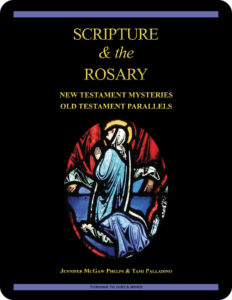a sword will pierce
 The Gospel According to Luke 2:35 (NABRE) contains one of the more difficult passages about our Blessed Mother: “(and you yourself a sword will pierce) so that the thoughts of many hearts may be revealed.”
The Gospel According to Luke 2:35 (NABRE) contains one of the more difficult passages about our Blessed Mother: “(and you yourself a sword will pierce) so that the thoughts of many hearts may be revealed.”
There’s an especially interesting image here around the idea of piercing, which is a bit of an odd word choice in the Greek. The Greek word διέρχομαι (dierchomai) literally means “to go through” and in every other case in the New Testament the word is used to describe travel—someone passing through a region or area or even passing through from life to death. While the English translation “pierce” does convey essentially what’s happening, “pierce through” would perhaps be a fuller translation.
There’s also an additional meaning possible. When a traveler passes through an area, that traveler no longer is there. This passage could likewise be read that the sword passes through our Blessed Mother’s heart but doesn’t remain. Regardless of the exact best English rendering of this passage, it invites us to reflect on our Blessed Mother’s suffering as a part of her role in bringing about our salvation.
you also may like our study of Scripture & the Rosary (digital only)
 Scripture & the Rosary: New Testament Mysteries, Old Testament Parallels, a 26-lesson Catholic Bible study with an imprimatur, looks at the biblical foundations of the Rosary. The study includes lessons on Pope St. John Paul II’s Rosarium Virginis Mariae (Rosary of the Virgin Mary), the Apostles’ Creed, and the Luminous Mysteries as well as the original 15 Mysteries of the Rosary. Color photographs of stained glass windows depict key scenes in the lives of Jesus and Mary. Free digital lessons rotate throughout the year on our website.
Scripture & the Rosary: New Testament Mysteries, Old Testament Parallels, a 26-lesson Catholic Bible study with an imprimatur, looks at the biblical foundations of the Rosary. The study includes lessons on Pope St. John Paul II’s Rosarium Virginis Mariae (Rosary of the Virgin Mary), the Apostles’ Creed, and the Luminous Mysteries as well as the original 15 Mysteries of the Rosary. Color photographs of stained glass windows depict key scenes in the lives of Jesus and Mary. Free digital lessons rotate throughout the year on our website.
 Click on the picture of the statue of Moses with horns (above) to learn more about Lost in Translation. A new entry is archived each Monday. Contact us to receive Lost in Translation by email every week. You may use any of the contact links on our website to ask Matthew a question.
Click on the picture of the statue of Moses with horns (above) to learn more about Lost in Translation. A new entry is archived each Monday. Contact us to receive Lost in Translation by email every week. You may use any of the contact links on our website to ask Matthew a question.
